| 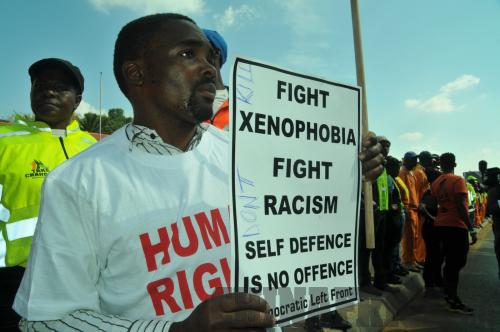
Thousands of South Africans took to the streets of downtown Johannesburg denouncing xenophobia FRANCISCO LITTLE
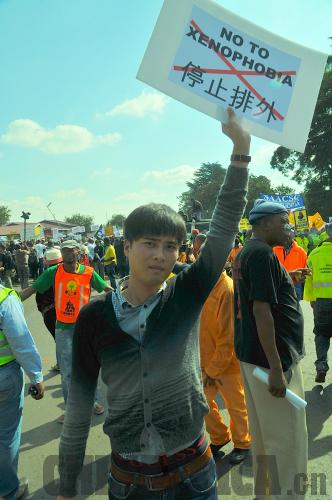
Thousands of South Africans took to the streets of downtown Johannesburg denouncing xenophobia FRANCISCO LITTLE
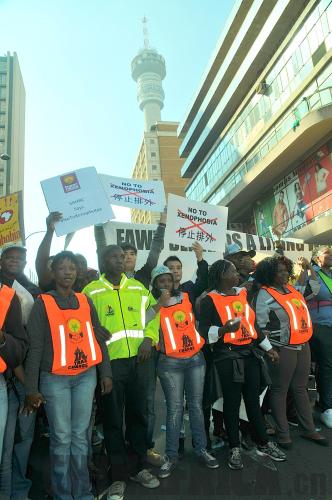
Thousands of South Africans took to the streets of downtown Johannesburg denouncing xenophobia FRANCISCO LITTLE
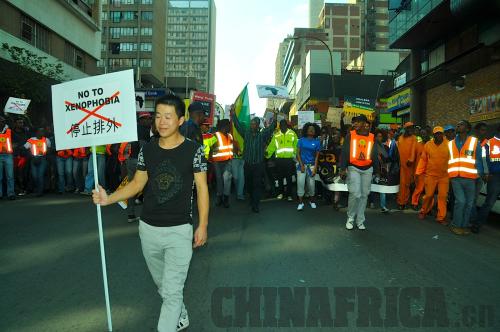
Thousands of South Africans took to the streets of downtown Johannesburg denouncing xenophobia FRANCISCO LITTLE
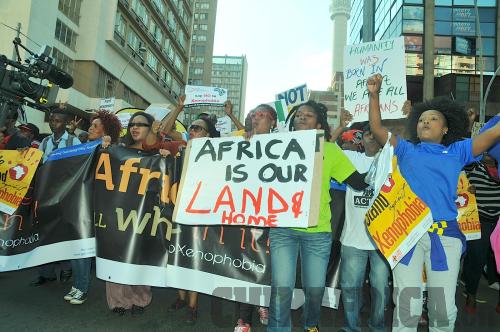
Thousands of South Africans took to the streets of downtown Johannesburg denouncing xenophobia FRANCISCO LITTLE
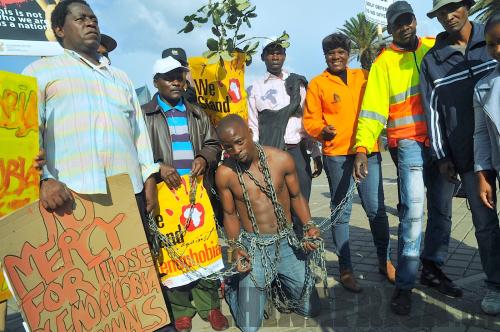
Thousands of South Africans took to the streets of downtown Johannesburg denouncing xenophobia FRANCISCO LITTLE
South Africans are coming out in their numbers at gatherings and marches across the country denouncing the recent spate of xenophobic attacks.
In Johannesburg, a silent night vigil featuring hundreds of lit candles to show solidarity with immigrants, was followed by a march of thousands through the city center on April 23. Civil society, activists, government leaders and streams of school children walked and sang their way for more than four km through the downtown area. Part of the route included some of the poorer areas of the city, home to many migrants. Watched by police, migrants and locals linked arms and carried placards bearing messages such as "Africa Unite" and "Welcome Foreigners." Many Chinese marchers could also be seen in the crowd, waving "No to Xenophobia" signs written in Mandarin.
One of the march organizers, Mark Heywood, executive director of NGO Section 27, said the aim was to bring together as many people as possible and condemn xenophobia.
"We wanted to show Africa and to show South Africa that we reject xenophobia, that we disassociate ourselves from violence against foreign people and that we stand for social justice and all people's dignity," he said.
Anti-xenophobic campaigner Alice Thangari told ChinAfrica that she wanted the attacks against foreigners to stop at once. "South Africans are peace loving people and we want to send a message to the world that we condemn these barbaric acts of violence against innocent people and everyone is welcome in our country," she said.
South African President Jacob Zuma has promised to tackle the simmering anti-migrant sentiment head on and address deep-ingrained causes behind the attacks.
"South Africans are not xenophobic," he said, adding that if the underlying issues are not dealt with, the attacks "will come back." He will meet with organizations representing foreign nationals as part of the resolution plan. Zuma said the violence was driven by "criminal elements" as well as friction between foreigners and locals.
That friction is often centered around corruption, inequality and unemployment. In a country with a 25-percent unemployment rate, disgruntled South African's often blame migrants for taking jobs and committing crime. Adding fuel to the fire is the fact that many migrants are undocumented and referred to as "illegals."
David Makhuru, premier of Gauteng Province, of which Johannesburg is the capital, told the large crowd that the march sends an important message to the world and to Africans. "We are going to defeat xenophobia like we defeated apartheid. We are here to make sure that South Africa is a country of peace for all," he said.
Further afield UN Secretary General Ban Ki-moon has condemned the violence and called for "all efforts" to be made to prevent future attacks. "He welcomes the public expressions of the many South Africans who have been calling for peaceful coexistence and harmony with foreign nationals," his spokesman said in a statement.
Xenophobic attacks directed mainly at migrants from Zimbabwe, Malawi, Mozambique and other African countries have led to the death of at least seven people in almost three weeks of unrest. This has caused tension in the region as neighboring countries monitor the situation.
The government has deployed the army to assist police in restoring order in the areas where attacks on migrants took place and arrests have been made.
Medecins Sans Frontiere, an international medical humanitarian organization have said that more than 5,000 people from Malawi, Zimbabwe, Mozambique, the Democratic Republic of the Congo and Burundi still seek refuge in displacement camps.
The recent spate of attacks have brought back stark memories of 2008 when similar attacks took place in the country, leaving 62 people dead. |